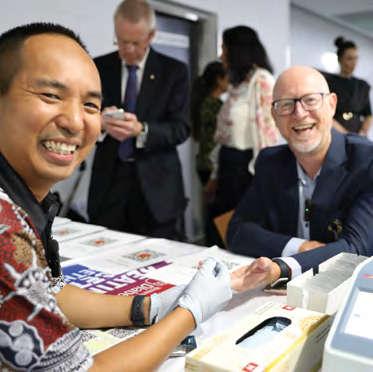










Diabetes has been an issue for Western Sydney, in fact, the diagnosis rates of diabetes in Western Sydney is higher than the New South Wales average. This has left Western Sydney to be labelled a diabetes ‘hotspot’ for many years.



Western Sydney is home to over 1 million adults and with diabetes rates continuing to climb, NSW Health estimates that 13% are diagnosed with type 2 diabetes while over 290,000 people are estimated to be at a high risk of developing diabetes (1).

In response to this health crisis, the Western Sydney Diabetes (WSD) initiative was established in 2014. WSD is a partnership between Western Sydney Primary Health Network, Western Sydney Local Health District, Diabetes Australia and the former Department of Planning, Industry and Environment with an Alliance of over 140 partner organisations.

Diabetes is a condition where there is too much glucose in the blood because the body can’t process insulin properly or is not making enough insulin.

Over time, high blood sugar levels can damage blood vessels and nerves, resulting in long term health complications including heart, kidney, eye and foot damage.

WSD is encouraging adults to get a blood test if they:
• Have a family history of diabetes

• Have an inactive lifestyle
• Are overweight or obese
• Had diabetes during a pregnancy

• Have a Pacific Island, Indian subcontinent, Chinese, Southeast Asian, Aboriginal or Torres Strait Island background.

WSD is dedicated to improving diabetes prevention and management e�orts through a series of partnerships and innovative programs. The WSD team o�er plenty of educational resources to help inform the Western Sydney community on the high rates of type 2 diabetes in the region, ways to help prevent against developing type 2 diabetes and how to detect it early.


It’s important to be aware of things you can do to lower your risk of developing diabetes. You can lower your diabetic risk if you:
9 Eat a mix of food from the five food groups every day (as per the Australian Dietary Guidelines).

9 Drink plenty of water
9 Exercise regularly

9 Manage your weight
9 Avoid smoking
9 Have regular health check ups




It is critical to visit a GP early. GPs can help prevent or manage diabetes-related complications by providing guidance on diet, exercise, and medication, and by coordinating care with other specialists.
To help find a GP, you can visit Healthdirect here.












In the lead up to National Diabetes Week 2025 (July 13-19), Western Sydney Diabetes (WSD) is partnering with Westpoint Shopping Centre Blacktown to run the Wellness Expo.

As part of the Wellness Expo, the WSD team will be o�ering a HbA1c test which will reveal the average blood sugar levels over the past three months and can tell people if they’re at risk, or already living, with Type 2 diabetes.

It only takes 3 minutes - no fasting, no prep, and you can pick up some educational resources as well.
There will be lots happening!
Some Westpoint stores will also o�er:

9 Mini health chats
9 Product demos
9 Friendly advice from health experts

We invite everyone to join the Wellness Expo and take advantage of the free services, health checks, and expert advice available.


There are more community programs available to you as well which include GP involvement such as Live Life Get Active and Heart Foundation Walking Groups. You can find out more about these here.


Data on hospital admissions in the Western Sydney area shows that nearly 20% of Aboriginal adults who present to hospital have diabetes, compared to just 14% of non-Aboriginal adults (2).

A clinic in Western Sydney is bridging the gap and improving health outcomes for Aboriginal and Torres Strait Island peoples with diabetes.
The Western Sydney Diabetes (WSD) clinic at Mount Druitt Community Centre emphasises cultural support and trust as a means of improving health outcomes.

The clinic is open on Monday specifically for adults who identify as Aboriginal and Torres Strait Islander and have Type 1 and complex Type 2 diabetes.

Aunty Rita Wright of Mount Druitt attended the clinic and said it helps those in her community who may be hesitant to seek medical intervention.


As part of their e�orts to help boost preventative approaches to diabetes, Western Sydney Diabetes has launched the 2kg Challenge. By joining the 2kg Challenge, you’ll get 8 weeks of support with healthy eating, exercise tips, and helpful advice. You’ll be guided through texts, emails, and videos, plus you’ll be part of an online community where you can get support and stay updated.

If you’re at risk for diabetes, losing just 2kg can lower your chances of getting diabetes by 30%! It’s a small change that can make a big di�erence.
You can lower your risk of type 2 diabetes in 5 simple steps.

1. Check in with your eating
2. Choose your way to move
3. Explore tools that suit you
4. Plan to keep going

5. Become a 2kg champion
Learn more and sign up for the 2kg Challenge here!



Aunty Rita said working with WSLHD Aboriginal Chronic Care nurse Shirley Brown ‘makes all the di�erence’.
“Shirley is always there for us; she explains things to us and tells us we’ve got to do it. That’s the di�erence, having her here. She understands us,” Aunty Rita said.

Learn more about the Aboriginal and Torres Strait Islander Monday Clinic here.
More programs are available to you in Western Sydney which involve GPs providing support to your community. These include Too Deadly for Diabetes and Pasifika Preventing Diabetes, you can find out more info on this here.



WSD has produced plenty of helpful resources including more than 130 educational videos for patients and 30 educational videos for GPs featuring specialists explaining the impact diabetes can have on you, diabetes management, how to prevent diabetes, diet tips and di�erent types of diabetes medicines.

